

This year, we welcome four new teachers to the Hiba Nursery team. Charlie Suero (EY2), Emily Lee (EY1), Elaine Barker (EY3) and Michael Caddy (EY2) bring a diversity of career experience and unique insights to the classroom. Here they are in their own words.
Elaine Barker:I began teaching in Seoul, South Korea. I enjoyed it so much that I decided to continue for another year, but the idea of working in China fascinated me, so I relocated here. At that point, I was all in. I realised that this was what I want to do, so I returned home to England to earn my PGCE and QTS and complete my NQT year. I then spent an additional year working for a children's charity before returning to Shanghai in 2018.
Emily Lee:Before going into education, I was a nurse for about seven years. As a nurse, I was always responsible for training the new hires when they came on board, and I really liked the teaching aspect of the work. When I moved to Shanghai with my husband, I was at a career crossroad. I could either continue nursing or go into teaching. I chose teaching and soon realised that I wanted to upgrade my skill set, so I just finished my PGCE this summer, and I have a MACAR certification, which is a Montessori system for teaching children with learning differences. I actually thought I wanted to teach older children but working with little children, I really feel like I have found my niche.
Michael Caddy: I came to China in 2012 and got my start at a school teaching English to more than 1000 primary school-aged children every two weeks. There was no curriculum. We were not provided with textbooks, so I had to be inventive and resourceful. A fellow teacher and I began developing our own curriculum, based on what we thought would be engaging for the children. I eventually moved to Shanghai and started teaching younger children. I soon realised that I enjoy teaching a younger age group so much more. I see a lot more genuine interest from the children in this age group. They can be so insightful, which makes the work so rewarding.
Charlie Suero:I have been in education for over 10 years now, working in different capacities from early years to university. My experience ranges from working for Montessori schools to American and Canadian schools. I have my Montessori certification, my QTS and my US licensure. Education is where I found my niche. I grew up in a military family. My family moved almost every year for the first 10 or 12 years of my life, so school was a place where I found normalcy, comfort and a challenge. I always thought that if I could work in that kind of environment in some sort of capacity, I would feel fulfilled, which I certainly am.
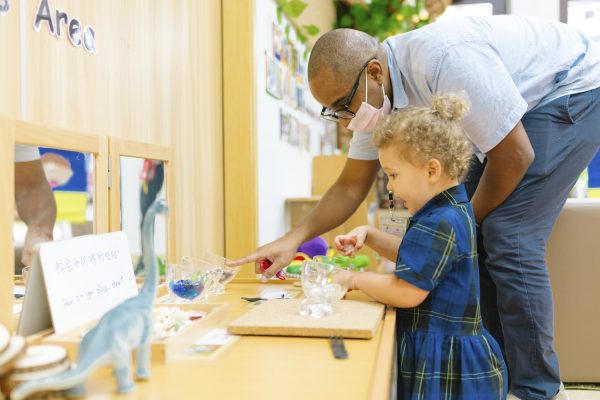
Charlie Suero:I was immediately attracted to the play-based curriculum. I have taught in Montessori schools before, so I already had some experience with this educational model, but I was fascinated with how it would work in China because I think a lot of people do not necessarily equate play with learning. So, it was a really interesting concept that I want to learn more about, and I saw it as a new way to challenge myself.
Emily Lee:I came here as a teacher in training and teaching assistant in my first year, and it was the environment that really appealed to me. Everybody is so friendly. I enjoy working with my teaching partner and teaching assistants. I also really like that everything here has a system. We are strict about assessments, and we do so early and often, so we understand where children started, where they are and where they are going. That challenges me, and I love it.
Elaine Barker:The nursery has a great reputation and I wanted to be a part of it. I have worked in schools where the curriculum was in-house or an amalgamation of several curricula. My training in the UK was British curriculum-based, and I looked forward to doing my work in the curriculum I studied. When I learned that this nursery specialised in play-based learning, I just wanted to get involved.
Michael Caddy:I have taught at schools with a Montessori curriculum, and I have taught at schools with an IB PYP curriculum, so when I learned about Hiba Nursery and its learning through play approach, I immediately knew this was where I want to be.

Charlie Suero:When I first stepped on campus, I attended a training session. Vanessa Szucs-Hussain was doing a training session, and it was so inspiring to see her in her element working with the team. But when it was over, suddenly I found myself in a dance-off with her. It was just nice to see a leader, someone who I regard as a mentor be able to take things down a notch and relax. I realised then that while we are expected to work hard and do our best work, we still need to take time now and then have some fun.
Elaine Barker: My first impression is similar to Charlie's. I showed up at the same meeting, and Vanessa unexpectedly introduced me to everybody. She conducted the meeting with such passion and intensity, but she managed to keep things light and funny, too. I immediately realised that this was a place where I could feel welcome and comfortable and just be myself.
Emily Lee:When I first came here for an interview, the first thing I noticed was how polite and welcoming the guards were. Then I noticed that the service staff, like the cleaning ladies, would greet me with a smile. That made me feel so good, because, if you look at a working environment, the people at the bottom of the hierarchy can tell you a lot about how an organisation is run. If they are happy, then the rest of the organisation is usually pretty happy, too. As it turns out, my hunch was correct.
Michael Caddy: I was just struck by my first meeting with Vanessa and Yuki Gong. I quickly got a sense of the collegial spirit among the staff here. They were comfortable with each other and able to laugh and joke together. Then they gave me a tour of the Nursery. We went to a classroom and I saw all of these children running around and having a great time. Sitting down with them and learning their experiences made me realise that it was a wise decision to join this team.
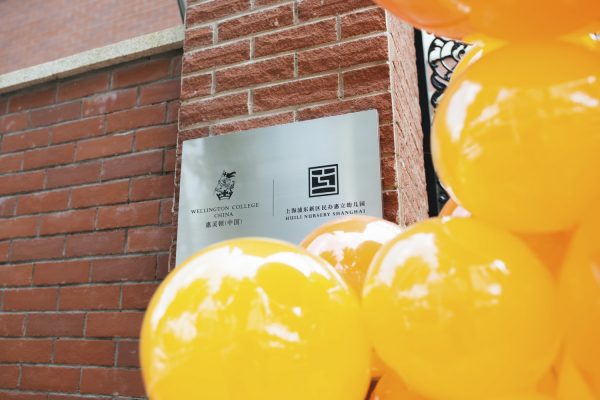
Charlie Suero:This is still a work in progress for me, but my biggest challenge is keeping up with the administrative procedures and protocols. But I see it as an opportunity to use and develop a lot of important skills. It has also opened my eyes to just how necessary they are to the functioning of the team.
Emily Lee: My challenge learning how to wait for the children. As a nurse, I was trained to be technical and think of my work in terms of inputs and outputs and then know what to expect. But it does not work that way with children. They may not do exactly what you expect them to do when you expect them to do it. They operate on their timeline, not mine. The mentoring I have received here has taught me that all of this is okay, that I have to just be patient. It is something that I continue to learn, and I appreciate it.
Elaine Barker: My challenge has been to get a handle on the vast scale of what we do here, just being part of this nursery and having access to the wealth of resources we have at our disposal. There are endless opportunities here to enhance our pupils' learning experience, and I have never really worked in an environment where I can ask for what I need and get it. To be honest, this is quite a good challenge to have to face.
Michael Caddy: Other schools I have taught for have had very regimented schedules. Things are much more fluid here, and because the line between learning and play is almost non-existent, nearly everything our pupils do presents an opportunity for a learning experience. So, you have to maintain a teaching mindset at all times, which at first, is quite a challenge to get your head around.
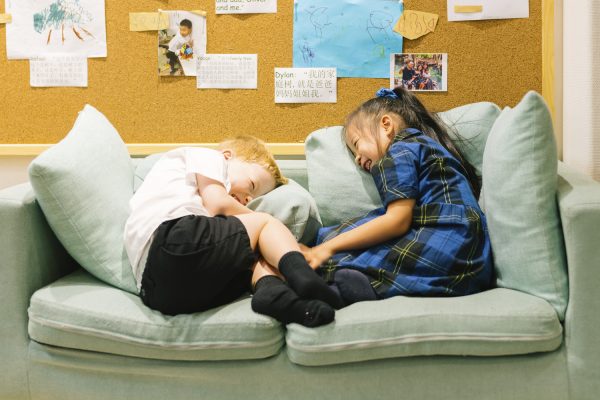
Charlie Suero:I see myself as a student before I am an educator. I can learn from somebody even if they are two years old. Because we are a bilingual nursery, there is a whole other component of culture and language to this idea as well. A pupil may be perfectly capable of expressing him- or herself, but not necessarily in my mother tongue of English. This always gives me pause and makes me think about how I approach situations with my language and my own biases.
Emily Lee:I am constantly adjusting my approach, but one constant is that I feel the need to be at eye-level whenever I talk with our pupils. I want them to know that it is okay to make a mistake. It is okay to get messy. It is okay to fall. Everything is okay.
Elaine Barker:I ultimately just want our pupils to be excited about coming here every day. If they ask their parents, "Do I get to go to nursery today?" and they look forward to coming here to play, learn and be with their friends all day, then I feel like I am succeeding.
Michael Caddy:Everything is a new experience for children at this age, and I just want to broaden their horizons in any way that I can and show them something they have never seen before. As an educator, it is just a wonderful opportunity to have a blank slate to fill in like this.
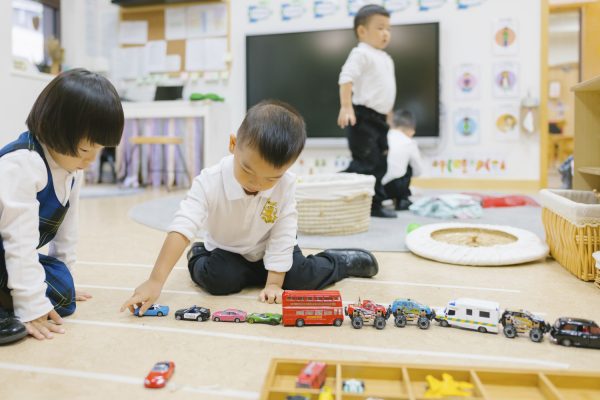
Charlie Suero:Your child is in our care for several hours a day, but you will always be their first teacher. You are that first hero, that first role model and that first standard that they will seek to emulate. So, it is important to be mindful of the example you set. Also, do not be afraid to ask for help or seek support. It is okay not to have all of the answers, and we can work together to help you find them.
Emily Lee:Our first instinct as parents is to say "no" to our children, but the answer can also be "yes" if we make the effort to exhibit the behaviour we want our children to emulate. So, for instance, we do not need to say, "No! You cannot play with bubbles" if we take the time to model the behaviour of cleaning up after playtime is over. This approach opens up ever more learning opportunities.
Elaine Barker:Just let your children enjoy this time. They are only little once. Let them have these wonderful memories now. There is a lot of pressure in life later on, so let them play, and that is what our nursery allows.
Michael Caddy:Trust the teachers and trust they are doing the best that they can do for your children. Also, just be involved with them. Ask them questions about their day and spend as much time as possible with them. These are some of the best times that you can share with them.
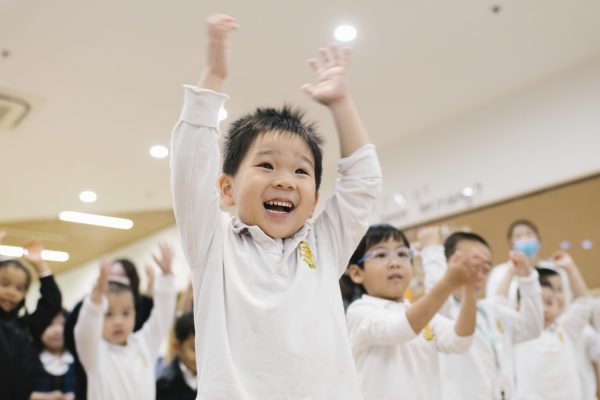
In the end, we want to thank Charlie, Emily, Elaine and Michael for sharing their experience.